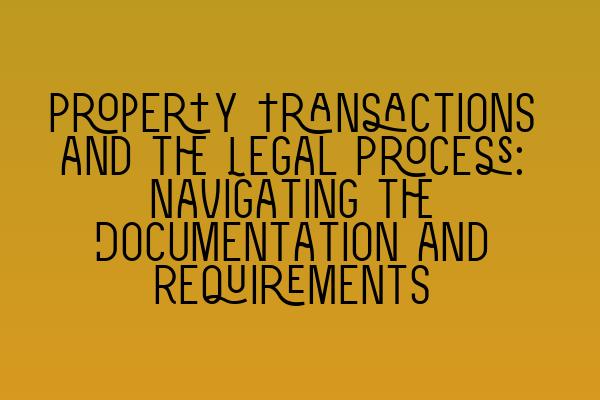Property Transactions and the Legal Process: Navigating the Documentation and Requirements
Whether you are a buyer or a seller, navigating the legal process of property transactions can be a complex and overwhelming experience. From understanding the documentation involved to meeting the necessary requirements, it is crucial to have a clear understanding of the entire process. In this blog post, we will guide you through the essential aspects of property transactions, ensuring a smooth and hassle-free journey.
1. Introduction to Property Transactions
Property transactions refer to the buying or selling of real estate, including residential or commercial properties. These transactions involve several parties, such as buyers, sellers, solicitors, estate agents, and mortgage lenders. Each party plays a distinct role in ensuring the successful completion of the transaction.
2. The Legal Process
The legal process of property transactions involves a series of steps that need to be followed diligently. These steps typically include:
a) Offer and Acceptance: The buyer submits an offer to the seller, who has the option to accept, reject, or negotiate the terms.
b) Drafting the Contract: Once the offer is accepted, a legal contract is drafted by the seller’s solicitor. This contract outlines the terms and conditions of the sale, including the purchase price, completion date, and any special conditions.
c) Property Searches: The buyer’s solicitor conducts various searches to uncover any legal issues or restrictions that may affect the property’s value or ownership. These searches typically include local authority searches, environmental searches, and water and drainage searches.
d) Survey and Mortgage Application: The buyer arranges for a survey of the property to assess its condition and value. At the same time, they apply for a mortgage if required, which involves providing the necessary documentation and financial information to the mortgage lender.
e) Exchange of Contracts: Once all parties are satisfied with the terms and conditions, the contracts are exchanged between the buyer and seller. At this stage, a deposit is usually paid by the buyer, creating a legally binding agreement.
f) Completion: On the agreed completion date, the remaining balance is transferred from the buyer to the seller, and ownership of the property is officially transferred. The buyer’s solicitor registers the change of ownership with the Land Registry.
3. Documentation and Requirements
Documentation forms an integral part of property transactions and includes the following:
a) Title Deeds: These documents provide proof of ownership and details of any restrictions or rights associated with the property. They are essential for both buyers and sellers to review during the transaction process.
b) Transfer Deed: This document transfers the legal ownership of the property from the seller to the buyer. It includes details such as the property address, purchase price, and parties involved.
c) Mortgage Deed: If a buyer requires a mortgage to fund the purchase, a mortgage deed is prepared by the lender. This document outlines the terms and conditions of the mortgage agreement.
d) Property Information Form: Sellers are required to complete this form, which provides information about the property’s boundaries, utilities, planning permissions, and other relevant details.
e) Energy Performance Certificate (EPC): An EPC is necessary for most properties being sold or rented. It provides information about the property’s energy efficiency and recommendations for improvement.
f) Identification and Proof of Funds: Both buyers and sellers need to provide identification documents, such as passports or driving licenses, to verify their identity. Buyers also need to provide proof of funds to demonstrate their ability to finance the purchase.
It is essential to have all the documentation in order and ensure compliance with the legal requirements to avoid any potential delays or complications during the transaction process.
4. Seeking Professional Assistance
Navigating the legal process of property transactions can be complex, time-consuming, and stressful. It is highly recommended to seek the assistance of a qualified solicitor experienced in property law. A solicitor can guide you through the entire process, review the documentation, conduct searches, negotiate on your behalf, and ensure compliance with legal requirements.
At SQE Property Law & Land Law, our team of experienced solicitors provides comprehensive advice and support for all your property transactions. From initial consultation to completion, we are dedicated to making your property transaction process as smooth and efficient as possible. Contact us today to discuss your specific requirements and find out how we can assist you.
In addition, if you are preparing for the Solicitors Qualifying Examination (SQE), we offer SQE 1 and SQE 2 preparation courses to help you succeed in your legal career. Take advantage of our SQE 1 Practice Exam Questions and SQE 1 Practice Mocks FLK1 FLK2 to enhance your knowledge and improve your chances of passing the exam.
Stay updated with the latest SRA SQE Exam Dates. Check out our SQE 1 Preparation Courses and SQE 2 Preparation Courses to ensure you are well-prepared and ready to excel in your exams.
Remember, a successful property transaction is not just about the legal process but also about having the right support and expertise by your side. Choose SQE Property Law & Land Law for a seamless and stress-free experience.
